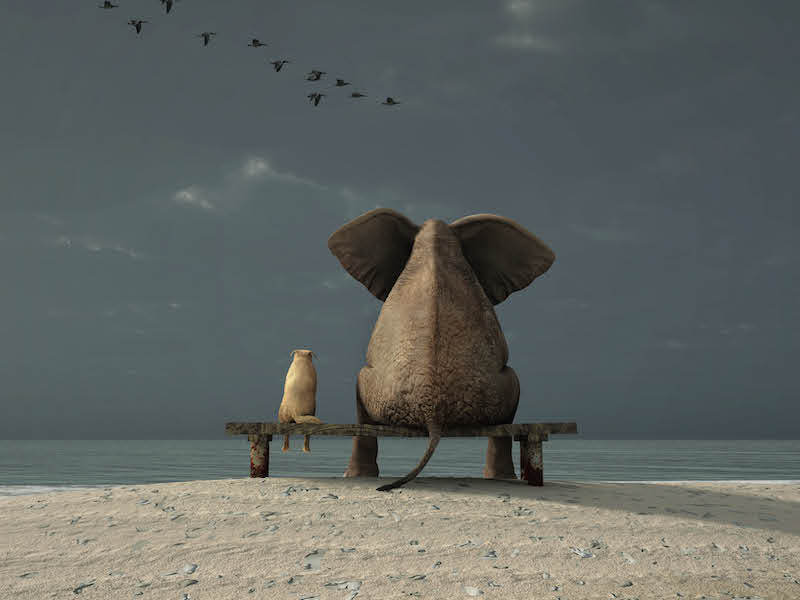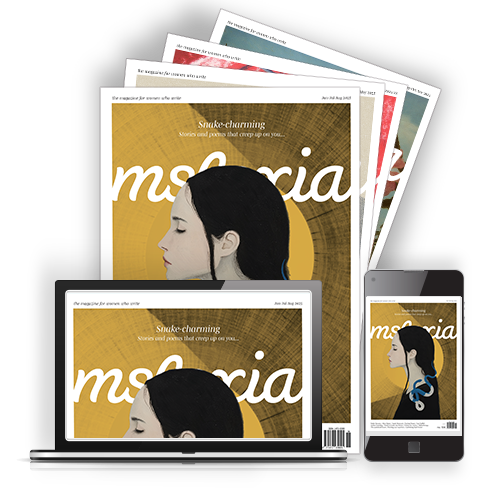
Inspired by Stephanie’s article, acclaimed author and writing tutor Margaret Wilkinson led a ‘Short story vs novel’ writing workshop on 5 June 2023 in the Mslexia Salon, to help our members decide which form is right for them. In a series of exercises, she encourages you to move between forms, and harness the strength of each form as you write. This online workshop was recorded and is free to view for Salon members, you can join the Salon for just £12 a year.
The short story seems to be enjoying a revival in popularity. In March this year a new animated film Blind Willow, Sleeping Woman brought the stories of Haruki Murakami to the big screen, and last year saw the launch of Scratch Books, a new independent press entirely dedicated to publishing short stories. Also last year the Observer reported that submissions to Dublin-based literary magazine The Stinging Fly had increased by 100 per cent over the previous two to three years and subscriptions had risen by 50 per cent during the pandemic.
So what’s behind this apparent increase in popularity? Is it a lockdown effect? Are writers deciding they prefer to write short stories? Are our attention spans shrinking after a steady diet of social media? Or are more people simply deciding to write fiction and thinking short stories might be a good place to start?
Ever since I can remember I’ve wanted to write and when I started with short stories I felt instinctively I’d found my niche. Then some years ago I did a creative writing MA on which I tackled a novel and by the end of the course, I felt I’d lost the knack of writing short fiction. Somehow, the luxury of the novel-writing process – all that extra room and the opportunity to let it unfold as I wrote rather than having the whole thing in my head before I started – had changed me as a writer. I’ve been trying to return to my first love ever since with mixed success.
Had others had the same experience? To find out, I turned first to my former creative writing tutor, the novelist and short story writer Tessa Hadley. Unlike me, she moves easily from one form to the other: ‘I’ve been doing the two alongside each other from the beginning,’ she says. ‘I love to finish a chapter, put my novel away for a couple of months, then write a short story. And that seems advantageous for the novel. You get some distance from it – and a purchase on where you are and what needs to happen next.’ There was an even more beneficial effect on the short stories. ‘I suddenly felt I was onto something, and that something truthful and interesting was coming out.’
Some writers think of short stories as the nursery slopes of fiction, which help build the skills for writing a novel; others consider them a significant genre in their own right, one that’s equally difficult to master. And there are those who believe you can only really excel at one or the other. Which is true?
Writer and Senior Lecturer in Creative Writing at Newcastle University Margaret Wilkinson says: ‘Short stories can be terrifically difficult – because they are so intricate, so concise, and yet they can suggest so much. But writing short stories is not a stepping-stone to becoming a novelist; I think they are equally significant.’
Novelist Jane Rogers agrees, but she didn’t always feel this way. ‘My view has changed over the years,’ she says. ‘I used to think short stories were nowhere near as important as novels, but I’ve come to believe they’re a more perfect form and more difficult to master. They have an intensity and an economy which is hard to learn.’
All agree that there are many published writers who do both brilliantly. ‘Think of the novels and short stories of Doris Lessing or Annie Proulx,’ says Rogers. ‘Hilary Mantel’s stories are wonderful too, though not as talked about as her novels.’ Hadley admires Elizabeth Bowen as an exponent; Wilkinson offers Helen Dunmore and Alison MacLeod – also Jhumpa Lahiri: ‘Many of her novels have beautiful language, which can be just as important as breadth or ambition.’
And it’s not just a matter of length – density and breathability must be part of the equation. ‘A novel is not just a long short story, and a short story is not just a short novel,’ says Wilkinson. ‘With novels the main issue is pace, forward momentum and narrative drive. And, of course, the plotting and the building of intensity that you don’t have space to achieve in a short story. They are different animals requiring different approaches and, yes, different capabilities.’
This is something Hadley, former Professor of Creative Writing at Bath Spa University, understands well. ‘It’s to do with the nature of the enterprise,’ she says. ‘There is something in each of them – short fiction and novels – where the length is not merely an arbitrary uninteresting aspect of the form: it’s total. And length dictates the degree and the density of organisation inside the writing. A novel has its own dynamics: there will be graceful sections that flow easily; and denser, more finely-wrought, sections. Knowing how to work those sections, and not stay with one or the other for too long, is part of the art.’
Crucial to that art is the question of beginnings and endings. ‘One of the things that really separates the short story from the novel is the importance of the ending,’ says Hadley. Wilkinson takes a similar view: ‘With a short story, there is something important about where to begin and where to end,’ she says. ‘And there’s something about how much territory it covers that some writers just understand. A short story has a perfect size and shape, and that sense eludes some people.’
All the writers I interviewed experimented with short fiction early in their careers. ‘Ever since I learned to write my name at school, I’ve made up stories,’ says Rogers, who was Professor of Creative Writing at Sheffield Hallam University and is now a mentor with the Gold Dust organisation. ‘But I find novels easier. The novel is a more forgiving form because you have the space to delve into character, and take the reader with you. In a story, you have only a very few brushstrokes, and they have to be precise. It’s hard – I think it’s harder.’
Rogers clearly has no trouble conquering those challenges, and her new story collection Fire Ready is out in July, published by Comma Press. Of her first, Hitting Trees with Sticks published in 2012, Marina Lewycka wrote: ‘Each story is a world in microcosm’ – which raises the question of scope, for stories of any length.
Whenever I begin a piece of fiction, I feel I need to know from the outset whether it’s going to be a novel or a short story. With short fiction I try to apply Ernest Hemingway’s iceberg theory: that you don’t have to spell everything out; by showing just the tip of the iceberg you can indicate to the reader what is hidden. He practised what he preached. It’s Hemingway who is often credited with what must be the shortest story in the world: ‘For sale: baby’s shoes, never worn.’
Wilkinson, who has written many plays and stories for radio and theatre, and whose second novel is due out with And Other Stories in the autumn, started by writing short stories just because they’re short. ‘It gives you the opportunity to experiment with tone, structure and form,’ she says. ‘It allows you to find your writing voice.’ She is currently working on a new collection and has an interesting take on the question of length: ‘My short stories are about 10,000 words each and my forthcoming novel is only 55,000 words. So I’m interested in both the short novel and the long short story. Also there’s a kind of blurring these days – think of the linked short stories of Elizabeth Strout or Alice Munro.’
Rogers and Hadley also offer the example of Alice Munro, the brilliant Canadian short story writer who won the Nobel Prize for Literature in 2013. ‘She is exceptional,’ says Hadley, ‘because there is something very novel-like about her stories. They have the follow-through of a novel without the length, without spelling everything out. Her second book, Lives of Girls and Women, was published as a novel, but it’s quite manifestly a set of linked short stories.’
Hadley’s new story collection After the Funeral is out in July, published by Jonathan Cape. But her first ‘novel’, Accidents in the Home, is really a set of short stories, linked by the same characters and presented in chronological order. ‘It is novel-like in that there’s an arc that takes us from the beginning to the end, but each chapter effectively stands alone,’ she says. And she recommends this approach to anyone who feels comfortable with the short form and wants to write a novel but doesn’t have the confidence to attempt the long span.
What about writers like me who are struggling with the shorter form? Wilkinson, whose Writing Short Stories forms part of the Mslexia Minis ebook series, has this advice: ‘Conceal, don’t reveal. Many people think writing is about uncovering a story for the reader, but it’s really about artful concealment: delay, hint, hint, hint, reveal. I think that’s true for both novels and short stories.’ She adds: ‘I think of a short story like a torch in a dark room. You’re shining it on one thing with incredible precision or clarity. That’s how it’s different to the novel – just that one image.’
I’ll take that stunning image with me when I go back the story I am working on and hopefully I’ll be able to look at it in a whole new light. And on the question of whether I’m a novelist, a short story writer, or both – after talking to these masters of their craft, I have decided that it doesn’t matter. The important thing is simply to write. If I trust that process, everything else will follow.
The long and the short of it
Examples of works by accomplished stylists who have succeeded with both forms.
Elizabeth Bowen
Novel: The Heat of the Day
Short story: ‘The demon lover’ from Collected Stories
Helen Dunmore
Novel: A Spell of Winter
Short story: ‘A view from the observatory’ from Girl, Balancing and Other Stories
Jhumpa Lahiri
Novel: The Namesake
Short story: ‘This blessed house’ from Interpreter of Maladies
Doris Lessing
Novel: The Golden Notebook
Short story: ‘Through the tunnel’ from To Room Nineteen: Collected Stories Volume One
Hilary Mantel
Novel: Wolf Hall
Short story: ‘Sorry to disturb’ from The Assassination of Margaret Thatcher
Alison MacLeod
Novel: Unexploded
Short story: ‘The thaw’ from All the Beloved Ghosts
Annie Proulx
Novel: The Shipping News
Short story: ‘Brokeback Mountain’ from Close Range: Wyoming Stories
STEPHANIE BOXALL is a freelance writer who has worked in magazine journalism, mainly as a sub-editor, for more than 30 years. She loves to write fiction when she can and is currently working on improving her short story writing skills.

